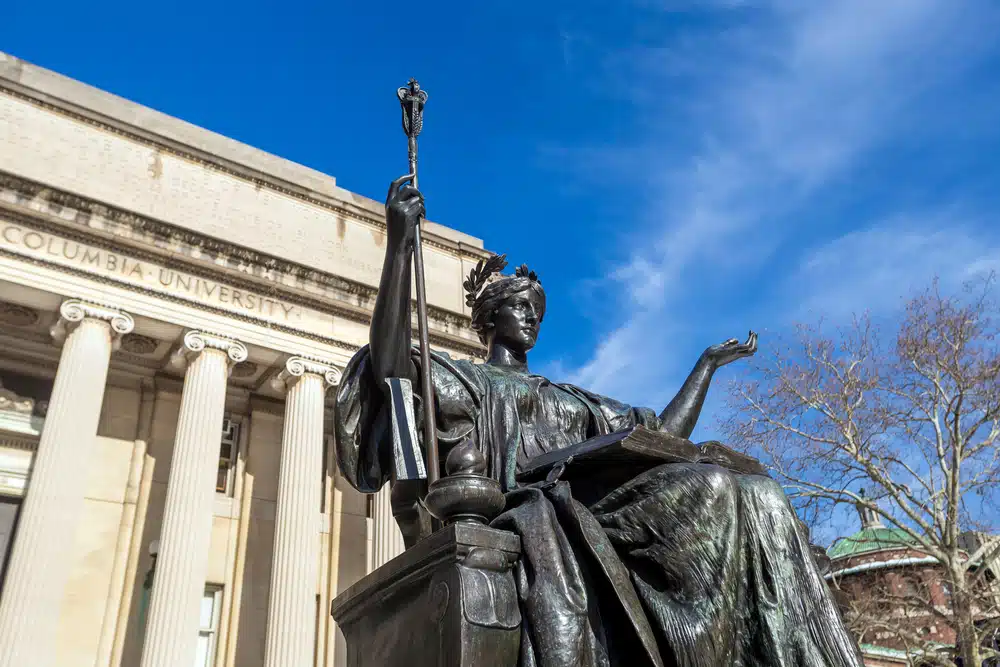Columbia Letter of Recommendation
Are you applying to Columbia University? Along with your academic achievements and personal statement, one crucial component of your application is the recommendation letter. In this article, we will delve into the importance of the Columbia letters of recommendation in the application process and guide you on choosing the right person to write your letter, crafting a standout recommendation, and navigating the submission process.
Understanding the Importance of the Columbia Letters of Recommendation
Columbia letters of recommendation play a significant role in assessing your capabilities and potential as a student at Columbia University. They provide insights into your character, work ethic, and abilities beyond what can be seen through grades and test scores alone.
The admissions committee at Columbia relies on these letters to gain a deeper understanding of who you are as an individual and the impact you can make on campus.
When it comes to college admissions, the competition can be fierce. With thousands of applications flooding in each year, it becomes crucial to stand out from the crowd. This is where recommendation letters come into play. These letters serve as a powerful tool that can set you apart and give you an edge over other applicants.
Imagine you are a member of the admissions committee at Columbia University. You have a stack of applications in front of you, all filled with impressive grades and test scores. But how do you differentiate between these high-achieving students? This is where the Columbia letters of recommendation become invaluable. They provide a personal touch, giving you a glimpse into the applicant’s character, passions, and potential.
The Role of Recommendation Letters in Your Application
Recommendation letters offer a unique perspective on your abilities, achievements, and personal qualities. They can shed light on your intellectual curiosity, leadership skills, teamwork abilities, and commitment to community service.
Through these letters, the admissions committee hopes to gain a glimpse of how you may contribute to the vibrant Columbia University community.
Furthermore, recommendation letters can also highlight your academic achievements and potential. A letter from a teacher who witnessed your growth and dedication in the classroom can speak volumes about your intellectual curiosity and passion for learning. It can provide evidence of your ability to thrive in an academic environment like Columbia University.
Why Columbia University Values Letters of Recommendation
Columbia University puts a strong emphasis on holistic admissions, where they look beyond just grades and test scores.
Recommendation letters provide an opportunity for someone who knows you well to vouch for your potential and highlight your unique qualities. They help the admissions committee build a diverse and dynamic cohort of students who will thrive academically and contribute meaningfully to campus life.
At Columbia, they believe that a well-rounded student body is essential for creating a vibrant and intellectually stimulating environment. By considering the Columbia letters of recommendation, the admissions committee aims to identify individuals who not only excel academically but also possess the qualities that will enrich the campus community.
In conclusion, recommendation letters are a vital component of your college application to Columbia University. They provide a unique perspective on your abilities, achievements, and personal qualities, allowing the admissions committee to gain a deeper understanding of who you are as an individual.
So, when you ask someone to write a recommendation letter for you, choose someone who knows you well and can speak to your strengths and potential.
Who Should Write Your Recommendation Letter?
Choosing the right person to write your recommendation letter is crucial. The ideal letter writer is someone who knows you well and can speak to your abilities and personal qualities. It is essential to seek out individuals who can provide specific examples and anecdotes that reflect your strengths and potential as a student.
Choosing the Right Person to Advocate for You
When deciding whom to approach for a recommendation, consider individuals who have directly supervised your work in an academic or professional setting. Professors, research mentors, or advisors are excellent choices as they can provide insight into your intellectual capabilities, work ethic, and growth potential.
So, who should write your recommendation letter? Columbia requires two teacher recommendations. These recommendations should be from teachers who were your instructors in academic subjects. Engineering applicants must ensure one recommendation comes from a math or science teacher.
In addition, a recommendation from a high school counselor is required as part of the secondary school report.
For students who would like to submit extra Columbia letters of recommendation, the Undergraduate Admissions Office discourages the submission of additional recommendations because admissions decisions primarily rely on the required recommendations from your high school teachers and secondary school/guidance counselor.
An additional letter of recommendation will be accepted if it is provided by someone who has worked with you in a research or college course capacity.
While some applicants may consider submitting recommendations from coaches, internship supervisors, clergy members, or other community members, it is recommended that you utilize the Activities section of your admission application to showcase the breadth and depth of your extracurricular and non-academic involvements.
When selecting someone to write your recommendation letter, consider individuals who can provide a comprehensive and detailed account of your abilities, achievements, and potential. By choosing the right person, you can ensure that your recommendation letter highlights your strengths and enhances your chances of being accepted into your desired academic institution or securing your dream job.
Crafting a Standout Columbia Letters of Recommendation
Now that you have identified the right person to write your recommendation letter, it’s essential to help them craft a compelling and authentic portrayal of your abilities and potential. Here are some key elements to consider:
Key Elements of a Strong Recommendation Letter
A strong recommendation letter should be tailored to your application and highlight specific traits or experiences that make you an excellent fit for Columbia University.
It should emphasize your intellectual curiosity, critical thinking skills, ability to collaborate, and passion for learning. Providing concrete examples of your achievements and growth will strengthen the letter’s impact.
For example, if you have participated in research projects or internships that have allowed you to apply your knowledge and skills in a real-world setting, be sure to mention these experiences. Highlight any significant contributions you made or challenges you overcame during these experiences, as they demonstrate your ability to excel in a rigorous academic environment.
In addition to academic achievements, it’s also important to showcase your extracurricular involvement and leadership roles. If you have held positions of responsibility in clubs, organizations, or community service initiatives, discuss how these experiences have shaped your character and contributed to your personal growth. This will give the reader a well-rounded view of your abilities and potential.
What Columbia University Looks for in a Recommendation
Columbia University values recommendation letters that provide insight into your personal qualities, intellectual abilities, and potential for success in rigorous academic settings.
The admissions committee seeks students who demonstrate intellectual curiosity, resilience, passion for their chosen field, and the ability to contribute meaningfully to campus life. Ensure your Columbia letters of recommendation align with these values and highlight your unique strengths.
When discussing your personal qualities, consider including anecdotes or examples that illustrate your character traits. For instance, if you are known for your perseverance and determination, share a story of when you faced a significant challenge and how you overcame it. This will give the reader a deeper understanding of your resilience and ability to thrive in demanding situations.
Furthermore, emphasize your passion for your chosen field of study. Discuss any research projects, academic papers, or independent studies you have undertaken that demonstrate your dedication and enthusiasm. Highlight any unique perspectives or innovative ideas you have brought to your field, as this will showcase your intellectual curiosity and potential for making a meaningful impact.
Lastly, don’t forget to mention how you can contribute to campus life at Columbia University. Whether through your involvement in clubs, sports teams, or community service initiatives, emphasize how you plan to engage with the university community and make a positive difference.
Admissions committees are not only looking for academically strong students but also individuals who will actively contribute to the vibrant campus culture.
Submission Process for Columbia Letters of Recommendation
Understanding the submission process for Columbia letters of recommendation is crucial to ensure a smooth application experience. Here’s what you need to know:
When it comes to applying to Columbia University, recommendation letters play a significant role in showcasing your abilities, achievements, and potential.
These letters provide valuable insights into your character and academic capabilities, helping the admissions committee make informed decisions. To ensure that your application stands out, it is essential to understand the submission process for recommendation letters.
How to Submit Your Recommendation Letter
Columbia University typically requires recommendation letters to be submitted online through the application tools. Columbia University accepts applications through the Coalition Application on Scoir or the Common Application. The university also welcomes the QuestBridge Application from QuestBridge Finalists.
Recommendation letters should be electronically submitted through the school-specific supplements available on these application platforms. Meanwhile, for additional recommendations, students can send them directly to [email protected], along with the applicant’s name, high school, and date of birth.
Ensure that your letter writer follows the guidelines provided by Columbia and submits the letter by the specified deadline. It is essential to maintain open lines of communication with your letter writer throughout the process. Regularly check in with them to ensure they have all the necessary information to write and submit the letter promptly.
Deadlines and Guidelines for Submission
Adhere to the application deadlines provided by Columbia University, including the deadline for recommendation letter submission. Missing deadlines can significantly impact your application’s review and may even result in disqualification.
The deadline for Early Decision applications at Columbia University is November 1st, while for those opting for Regular Decision, the application deadline is January 1st.
It’s crucial to provide your letter writer ample time to write and submit the letter on your behalf. Remember that professors and professionals are often busy with their own commitments, so it is important to approach them well in advance. By giving them sufficient time, you allow them to craft a thoughtful and comprehensive letter that truly reflects your abilities and potential.
Keep track of all deadlines to ensure a complete and timely application. Create a calendar or set reminders to stay organized throughout the application process. By staying on top of deadlines, you can avoid unnecessary stress and ensure that your application is submitted in its entirety and on time.
Remember, the Columbia letters of recommendation are an essential component of your application, providing valuable insights into your character, work ethic, and potential contributions to the university community.
By understanding the submission process and adhering to the guidelines and deadlines, you can present a strong application that highlights your qualifications and increases your chances of admission.
Common Mistakes to Avoid in Recommendation Letters
While recommendation letters can enhance your application, there are common pitfalls that you should avoid:
Pitfalls in the Recommendation Letter Process
Avoid choosing someone who does not have a good understanding of your abilities or cannot speak positively about your potential as a student.
Additionally, ensure that you provide your letter writer with the necessary context, such as your academic goals, accomplishments, and any specific aspects of your application that you would like them to address. Effective communication with your letter writer is vital to ensure a strong and tailored recommendation letter.
Ensuring Your Recommendation Letter Enhances Your Application
Ultimately, your recommendation letters should complement and strengthen the rest of your application. Ensure that they provide a holistic view of your abilities and illustrate how you align with Columbia University’s values and mission.
Be mindful of the information you have already provided in your personal statement and highlight unique aspects of your journey or experiences that have not been covered extensively in other parts of your application.
In summary, the Columbia letters of recommendation play a crucial role in your application. Choosing the right person to write your letter, crafting a standout recommendation, and navigating the submission process are vital steps to ensuring your application stands out.
With careful consideration and attention to detail, your recommendation letters can showcase your unique strengths and potential as a student at Columbia University.
AdmissionSight is your reliable partner in navigating the challenging Columbia admissions process and obtaining impressive recommendation letters. Our seasoned advisors are well-versed in the university’s requirements, providing personalized guidance to students. AdmissionSight offers strategies to foster strong connections with educators and mentors, ensuring compelling recommendation letters.
With AdmissionSight’s assistance, students are better prepared to showcase their strengths and enhance their prospects of gaining admission to this esteemed institution.









































